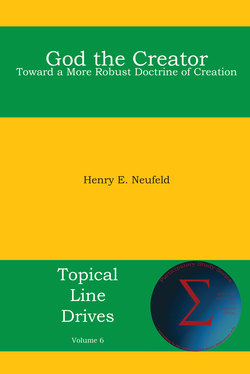Читать книгу God the Creator - Henry E. Neufeld - Страница 5
На сайте Литреса книга снята с продажи.
ОглавлениеIntroduction
While Christians are unified in seeing God as creator, they hold many different views about how God created the world. I frequently encounter people who are surprised to discover that different views exist. This isn’t just on one side. I find it equally likely to encounter a young earth creationist who is shocked that there are people who call themselves Christians and who also accept the theory of evolution as I am to find those who accept evolution but can’t believe there are people who actually accept a young earth (less than 10,000 years old) and a literal, seven day creation week.
In this small book I’m going to start by outlining the major views and key arguments. Much of this material will duplicate material found in my FastTracts book Christian Views on Origins.1
Differences in Sources
One of the reasons debates are so contentious is that this issue has important implications. It is understandable that people are concerned with God’s relationship to the universe and to them in particular. That is, after all, what the Christian message is about.
But what makes arguments even more contentious is that we disagree about what our sources of knowledge are, and how those sources are to be used.
This begins with basic differences in what we expect from our sources. Theologians distinguish general revelation, which is what is revealed in nature, in creation in general, and special revelation, which is what God has provided through his word in the form of the scriptures. There is a difference in the weight that different people give to these two sources. How much information does scripture provide about the physical world, and how are we to relate it to what we derive from science, i.e., from observation? This is very contentious. Both theistic evolutionists and young earth creationists will claim that the Bible and science do not conflict, but they mean very different things by those claims.
It is not simply a matter of the weight given to each, but the approach one takes to understanding each, and especially to scripture. Do you see scripture as a collection of various types of literature, or is it all similar? If you can read something as a poetic or even fictional account, for example, it can be of value for something, but generally not as an expression of scientific fact.
We will look more closely both at what we can expect to discover from various sources, how we can expect to discover it, and what weight to give the result.
Differences in Priorities
Besides our differences regarding the information, we also differ on the implications of that information. There are those who maintain that a belief in evolutionary theory really makes no difference theologically. This is not the case. It is both rooted in and results in a difference in our view of God, and especially of revelation. This can impact the way we read both general and special revelation.
Those who maintain a young earth position generally believe this is the only way to uphold the veracity and authority of scripture. Thus creation becomes tied to the authority of God’s word in scripture and to the accuracy of revelation. This leads back to what kind of literature one is reading. We would not criticize a historical novel because a character in the story did not exist historically. In such a novel, some of the characters are drawn from history and some are not.
To the believer in a young age for the universe, certain passages are narrative history, so they see anything that challenges that narrative history as contrary to scripture. A theistic evolutionist would likely claim to be honoring that scripture, but as a different literary genre, such as liturgy, myth2, or parable.
On the other hand there are those who work primarily from a theological view of salvation history. God the creator is also God the redeemer, and the issue is much more one of tying the first and second Adams together. This raises the additional question of whether a historical Adam and Eve are required in order to believe in the story of redemption.
The choices are not binary. There are a range of key issues (such as the existence of a historical Adam, or a precisely seven day creation week) which a particular believer holds as essential beliefs. When one challenges these essential beliefs, the person holding them feels the foundations of their faith shake. If X is no longer true, then Y, which depends on X, also might not be true, and if we go far enough forward, the entire structure crumbles.
Despite these differences of approaches, I would hope we can come together on the view that Christian doctrine should be Christ-centered. It is just such a doctrine that I will discuss in the latter portion of this book.
I hope this little book will help people come out into the open with their discussions of origins. It will be helpful to understand what the foundation of our belief system is. Whether we come to an agreement or not, simply discussing the scriptural roots, theology, and yes, the science of origins will prove valuable as we learn to live in God’s great universe.
1 Henry Neufeld, ed, Christian Views on Origins. Gonzalez, Florida: Energion Publications, 2020.
2 In a literary sense.
